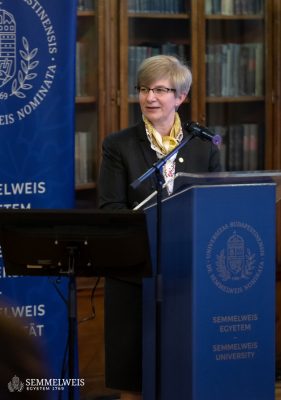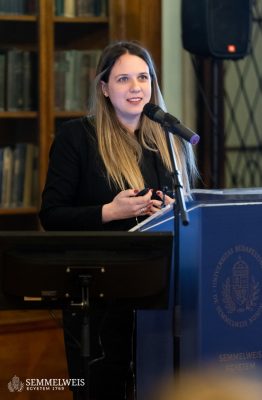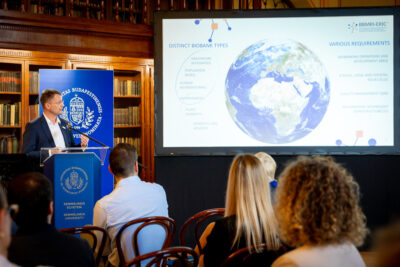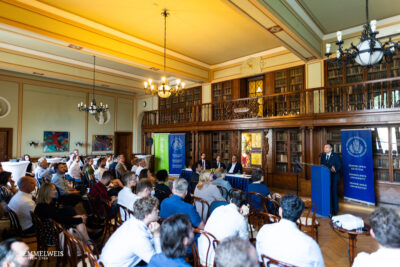 Opening the event, Dr. Renáta Papp, Director at the Centre of Science & Innovations Vice-Rector and Business Development reminded that Semmelweis University’s mission is based on the integrity of education, research & development and patient care. „Future development relies on the institution’s excellent researchers, and their capacity to attract new collaborations from academic and corporate partners in order to expand our network capacity,” she said, inviting all partners to be part of this journey, and develop the so-called ’research and development and innovation ecosystem’ together. „Our aim at the Centre of Science & Innovations Vice-Rector and Business Development is to promote all kinds of activities which are synergic with these objectives, and propel Semmelweis University towards the top 100 in the world,” she added.
Opening the event, Dr. Renáta Papp, Director at the Centre of Science & Innovations Vice-Rector and Business Development reminded that Semmelweis University’s mission is based on the integrity of education, research & development and patient care. „Future development relies on the institution’s excellent researchers, and their capacity to attract new collaborations from academic and corporate partners in order to expand our network capacity,” she said, inviting all partners to be part of this journey, and develop the so-called ’research and development and innovation ecosystem’ together. „Our aim at the Centre of Science & Innovations Vice-Rector and Business Development is to promote all kinds of activities which are synergic with these objectives, and propel Semmelweis University towards the top 100 in the world,” she added.
 Since the event was organized in collaboration with the Hungarian Society for Experimental and Clinical Pharmacology, Dr. Renáta Papp then introduced Dr. Zsuzsanna Helyes, General Secretary of the society. She explained that their organization is an umbrella society, serving clinical practice and experimental work as well, with more than 300 members. „Our society has a long tradition, since it celebrated its 60th anniversary last year; however in the future, we would like to focus more on new technology and challenges of pharmacology, cover a lot of disciplines and attract many clinical areas,” she said. Dr. Zsuzsanna Helyes noted that their next conference on basic and translational pharmacology takes place in Mátraháza on 7-9 June 2023, and their conference on clinical pharmacology is scheduled to be held in Debrecen, in early December 2023. They also have online webinars on the first Tuesday of each month at 15:30 CET, which proved to be very successful in the past years, she added.
Since the event was organized in collaboration with the Hungarian Society for Experimental and Clinical Pharmacology, Dr. Renáta Papp then introduced Dr. Zsuzsanna Helyes, General Secretary of the society. She explained that their organization is an umbrella society, serving clinical practice and experimental work as well, with more than 300 members. „Our society has a long tradition, since it celebrated its 60th anniversary last year; however in the future, we would like to focus more on new technology and challenges of pharmacology, cover a lot of disciplines and attract many clinical areas,” she said. Dr. Zsuzsanna Helyes noted that their next conference on basic and translational pharmacology takes place in Mátraháza on 7-9 June 2023, and their conference on clinical pharmacology is scheduled to be held in Debrecen, in early December 2023. They also have online webinars on the first Tuesday of each month at 15:30 CET, which proved to be very successful in the past years, she added.
 Dr. György Nagy, Head of the Department of Rheumatology and Clinical Immunology talked about ’difficult-to-treat’ rheumatoid arthritis (D2T RA), which affects approximately 20-30 percent of patients (who have persistent symptoms despite treatment). The biggest task is to create guidance for the comprehensive management of these patients via identifying contributing factors, adjusting pharmacological treatment and considering non-pharmacological options, said Dr. György Nagy. According to The European Alliance of Associations for Rheumatology (EULAR), if a patient has presumed D2T RA, the possibility of misdiagnosis and the presence of coexistent mimicking disease should be considered as a first step, Dr. Nagy highlighted. He also noted that the points made by the alliance to consider include that composite indices and clinical evaluation should be interpreted with caution in the presence of comorbidities in particular obesity and fibromyalgia, as these may directly heighten inflammatory levels and overestimate disease activity. Dr. Nagy went on to remind that in addition to pharmacological treatment, non-pharmacological options (i.e. exercise, psychological, educational and self-management interventions) should be considered to optimize the management of functional disability, pain and fatigue, and that appropriate support should be offered to patients to directly inform their choices of treatment goals and management.
Dr. György Nagy, Head of the Department of Rheumatology and Clinical Immunology talked about ’difficult-to-treat’ rheumatoid arthritis (D2T RA), which affects approximately 20-30 percent of patients (who have persistent symptoms despite treatment). The biggest task is to create guidance for the comprehensive management of these patients via identifying contributing factors, adjusting pharmacological treatment and considering non-pharmacological options, said Dr. György Nagy. According to The European Alliance of Associations for Rheumatology (EULAR), if a patient has presumed D2T RA, the possibility of misdiagnosis and the presence of coexistent mimicking disease should be considered as a first step, Dr. Nagy highlighted. He also noted that the points made by the alliance to consider include that composite indices and clinical evaluation should be interpreted with caution in the presence of comorbidities in particular obesity and fibromyalgia, as these may directly heighten inflammatory levels and overestimate disease activity. Dr. Nagy went on to remind that in addition to pharmacological treatment, non-pharmacological options (i.e. exercise, psychological, educational and self-management interventions) should be considered to optimize the management of functional disability, pain and fatigue, and that appropriate support should be offered to patients to directly inform their choices of treatment goals and management.
 Lilla Gunkl-Tóth, PhD student at the Department of Rheumatology and Clinical Immunology talked about the comprehensive investigation of pain and inflammation in difficult-to-treat rheumatoid arthritis. According to her, the most important is to understand the patomechanisms more thoroughly, reveal the connection between pain and psychological factors, and to identify molecules, mediators and signaling pathways as potential targets for future treatment developments. Among other things, they found that those who reported a considerably high level of dependence, social isolation, vulnerability to harm or illness and impaired autonomy or capacity all had a higher level of inflammation, but she stressed that it was suggested by an ongoing study which needs further investigation.
Lilla Gunkl-Tóth, PhD student at the Department of Rheumatology and Clinical Immunology talked about the comprehensive investigation of pain and inflammation in difficult-to-treat rheumatoid arthritis. According to her, the most important is to understand the patomechanisms more thoroughly, reveal the connection between pain and psychological factors, and to identify molecules, mediators and signaling pathways as potential targets for future treatment developments. Among other things, they found that those who reported a considerably high level of dependence, social isolation, vulnerability to harm or illness and impaired autonomy or capacity all had a higher level of inflammation, but she stressed that it was suggested by an ongoing study which needs further investigation.
The event’s key speaker was Dr. Georg Schett, Vice President for Research and Head of Department of Medicine 3 at Friedrich-Alexander University Erlangen-Nürnberg (FAU). Dr. Schett talked about chimeric antigen receptor (CAR) T cell therapy, which is essentially to get immune cells called T cells to fight a given disease by engineering them in the laboratory in a way that they attack the morbidity; more specifically, receptor proteins are enhanced to give T cells the ability to target a specific antigen.
 In his presentation, Dr. Schett showcased the efficacy of the CAR T cell therapy via a 20 year-old female patient who had several serious diseases besides SLE (Systemic Lupus Erythematosus), namely nephritis, pleurisy, endocarditis and arthritis. Following a 12-day procedure of the aforementioned transduction in 2021, there was a complete remission 44 days after the treatment with no further therapy needed; what is more, her CAR T cell levels were measurable at low levels even after months, according to Dr. Schett. When he expanded the program for five more patients with SLE, they showed exponential improvement too; also, there was a full depletion of B cells within the first 30 days after treatment. Three months later, their complement levels normalized, and clinical results included regression of proteinuria and a decrease of dsDNA antibodies. The improvements affected autoantibodies and vaccination responses as well, and reoccurring B cells showed a naive IgD/IgM based heavy chain pattern.
In his presentation, Dr. Schett showcased the efficacy of the CAR T cell therapy via a 20 year-old female patient who had several serious diseases besides SLE (Systemic Lupus Erythematosus), namely nephritis, pleurisy, endocarditis and arthritis. Following a 12-day procedure of the aforementioned transduction in 2021, there was a complete remission 44 days after the treatment with no further therapy needed; what is more, her CAR T cell levels were measurable at low levels even after months, according to Dr. Schett. When he expanded the program for five more patients with SLE, they showed exponential improvement too; also, there was a full depletion of B cells within the first 30 days after treatment. Three months later, their complement levels normalized, and clinical results included regression of proteinuria and a decrease of dsDNA antibodies. The improvements affected autoantibodies and vaccination responses as well, and reoccurring B cells showed a naive IgD/IgM based heavy chain pattern.
„The therapy itself has excellent tolerability: there is no evidence of higher grade Cytokine-Release Syndrome (CRS) and no case of Immune Effector Cell-Associated Neurotoxic Syndrome (ICANS) either,” said Dr. Schett. Summarizing the key lessons, he said that this kind of therapy should be taken into consideration mainly due to its feasibility in autoimmune disease. The rapid and sustained disappearance of B cells and clearance of anti-dsDNAantibodies, the cessation of SLE-associated manifestations as well the complete withdrawal of the entire immunosuppression is remarkable, he pointed out, adding that the recurrence of B cells was observed in all patients but was not associated with disease relapse. What is more, the reset of the B cell system is associated with the drug-free remission of SLE, he stressed. Currently, 7 SLE, 2 DM/ASS (diabetes mellitus/antisynthetase syndrome) and 1 SSc (systemic sclerosis) patient has been successfully treated within the program, and they are about to welcome the first patient outside of Germany, who arrives from France to be treated.
Viktória Kiss
Photo: Attila Kovács – Semmelweis University


